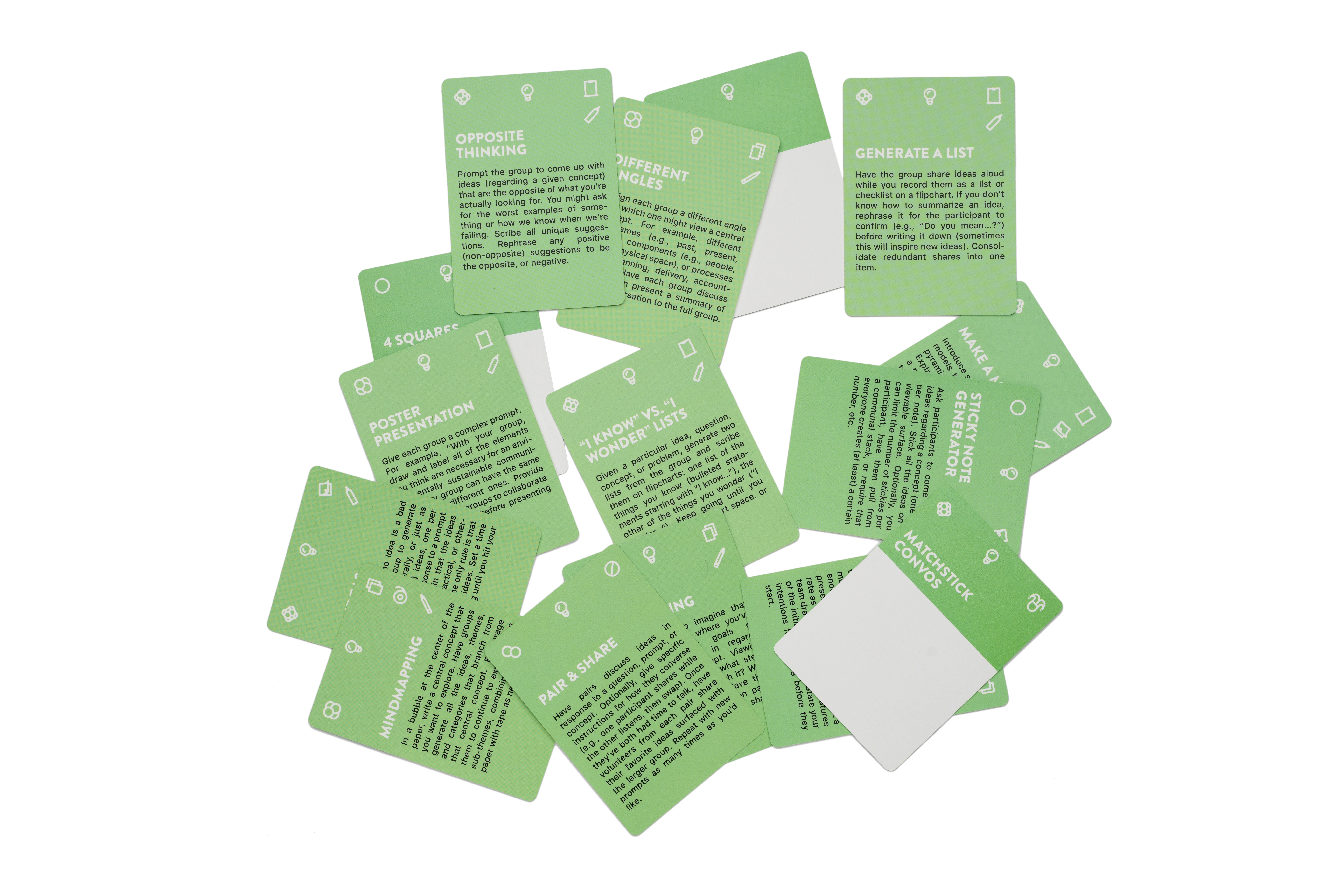While we are always fans of Generating A List, brainstorms can have wildly different results depending on what method we use to conduct them.
Here are three totally different methods to try the next time your group is coming up with ideas!
Pair & Share
One way to guarantee everyone participates? Put ‘em in pairs! This is a great way to lower the barrier of entry for folks who have ideas but don’t always feel comfortable voicing them in front of the large group. Create teams of two, give them the prompt, and let them bounce off of each other!
Prompts for Pair & Share
While any prompt works for this activity, here are a few we’ve used in past sessions:
“What are you hoping to get out of the session today?”
“Tell your partner about a person who has influenced your style of facilitation.”
“When you think about our goals as a unite, which ones are you most drawn to?”
”I Know” Vs. “I Wonder” Lists
A totally new way to frame a brainstorm! When you use “I know” vs “I Wonder” two things happen simultaneously.
The word “wonder” is a super approachable word. It’s kind of like the reverse feeling of when someone asks “does anyone have any questions” and people have statements, gaps of understanding, or don’t feel that the thought they have “makes sense” to put down. The word “wonder” lets participants know that ALL of those things qualify for the list.
The “I know” aspect reminds folks that they already know things about the topic, which can keep everyone from feeling overwhelmed, allows for past ideas to come back on the table, and allows for experts in the room to weigh in without feeling like they’re dominating the conversation
You can ask for these lists separately, or have people answer both of at once. “Give me one ‘I know…’ and one ‘I wonder…’” This stretches different parts of the brain and gives everyone a greater understanding of where they are at that moment.
Prompts for ”I Know” Vs. “I Wonder” Lists
“Write down one thing you know and one thing you wonder about our Quarter One goals.”
“What’s one thing you know and one thing you wonder about the chapter you read last night?”
“Let’s write down everything we know about the impact of assigning parking spaces. Great! Now we’re going to make a list of everything we’re still wondering.”
Opposite Thinking
Wowee is this one of our FAVORITE CARDS in the whole deck!
What’s awesome about Opposite Thinking is there are no wrong answers—what you want, are in fact, “wrong” answers. Bad habits, no go’s, antithetical ideas. For most people, this makes participation more fun and less intimidating (we often have to slow the group down just to get all the suggestions on the flipchart!).
Want to create a list of what makes a good meeting? Flip that prompt and write down all the ways you could guarantee a meeting goes poorly!
(Looking for even more on Opposite Thinking? Check out our Card Of The Month post!)
Prompts for Opposite Thinking
“How can we make sure this meeting is a total waste of time?”
“If you wanted to be a terrible leader, how would you do it?”
“If we wanted to make sure this project was a total failure what are small things that would make that happen?”
All That & More With Your Deck
When it comes to generating lists with a group, sometimes we have to switch it up to allow for more creativity and help folks expand beyond their usual answers. Pose prompts in a novel way, pair people up to help them collaborate, or get them thinking about their curiosities – on purpose!
Facilitator Cards are a deck of 60 activities to help you make the most of your sessions. Sometimes all we need is a new framework in order to create an entirely new outcome! Whether you are planning workshops, meetings, or crafting educational agendas, Facilitator Cards are a deceptively powerful tool to have in your back pocket (or on your desk!).
